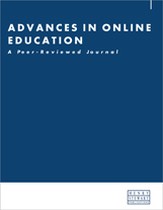Making space for the rabbit hole: Art education and eLearning development post-pivot
Abstract
The pivot to eLearning might have been a bitter pill to swallow for many at first — particularly art educators who find their pedagogy and andragogy steeped in the physical studio space. Soon educators came to notice the value online education was adding to learners’ experiences. Where some students were silent in class, they were vociferous in online forums. Their ability to attend to instructional content improved as they could watch and rewatch lessons and demonstrations. Art students began to view their artistic installations and studio practice from the metacognitive lens: how do I prepare my art for this physical space as well as how do I capture my art for the digital experience of that installation? In this case study, the authors describe their successes with social presence and engagement in art education eLearning, provide strategies for maximising art learner engagement online, share experiential evidence and preliminary survey data to support their observations around improved student engagement in class and beyond, and offer strategies art educators and administrators can immediately implement on campuses or in courses.
The full article is available to subscribers to this journal (subscription is free).
Author's Biography
Araminta Matthews Araminta Star Matthews is a seasoned Instructional Designer and Professional Writer with several publications both in academia and in genre. She has a Master of Fine Arts in creative writing from National University and a Bachelor of Fine Arts in the same discipline from the University of Maine at Farmington. She also holds graduate certificates in digital curation, career development facilitation and teaching. She has been teaching undergraduate courses in creative writing online for ten years at the University of Maine at Presque Isle, and she currently teaches an Introduction to Instructional Design course in the Graduate School at the University of Maine as well as Methods of Teaching Art in the K-12 Classroom for Maine Educator Consortium. Her publications include a co-authored writing manual with Rachel Lee and Stan Swanson Write of the Living Dead, a wellness book co-authored with The Lune Innate Crystal Intentions: Practices for Manifesting Wellness and scholarly publications within ArcGIS and on the subject of social presence design theory.
Maura Conley is a Learning Designer at the Center for Teaching and Learning and an Adjunct Assistant Professor in the Humanities & Media Studies and Intensive English programmes at Pratt Institute. With a degree in English and education and an MFA in creative writing, Maura’s ongoing academic work continues in the field of women, gender and sexuality studies. Her writing can be found in Transformative Approaches to Radical Wellbeing in Higher Education in ETH Zurich Learning and Teaching Journal, Feminist Digital Pedagogy: Broadening Horizons, Bridging Theory and Practice and Women in Higher Education Leadership.
Citation
Matthews, Araminta and Conley, Maura (2023, June 1). Making space for the rabbit hole: Art education and eLearning development post-pivot. In the Advances in Online Education: A Peer-Reviewed Journal, Volume 1, Issue 4. https://doi.org/10.69554/IXRI6582.Publications LLP
